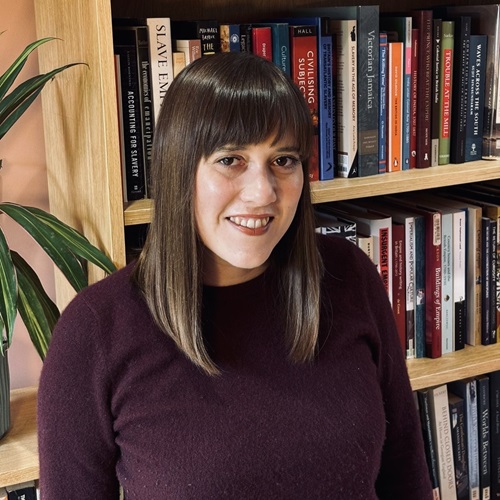Key details
Dr Hannah Young
Lecturer in History
In both her teaching and research, Hannah explores and confronts Britain’s relationship with enslavement and empire in the eighteenth and nineteenth centuries. She is particularly interested in interrogating the different ways these histories were gendered and exploring how British women negotiated and wielded power as enslavers and empire-builders.
Before joining Greenwich, Hannah was a lecturer at the universities of Exeter and Southampton, and an Economic History Society Tawney Fellow at the Institute of Historical Research. She also has a keen interest in public history and have worked at the Victoria and Albert Research Institute (VARI) as a Project Co-Lead and Public Engagement Fellow.
Responsibilities within the university
Lecturer in History
Awards
- AHRC International Placement Scheme award, 'The Absentee Duchesses: Gender, Family and British Slave-ownership' (2025)
- National Lottery Heritage Fund, ‘Remembering Section 28 in the South West on the 20th anniversary of its repeal’ (2023-2024)
- Nominated for a ‘Fair, Just and Inclusive Society Award’ at the University of Exeter’s 2024 Knowledge Exchange Awards (2024)
- AHRC Impact Accelerator Award, ‘Section 28 and its Afterlives’ (2023)
- ESRC Festival of Social Science Award ‘Section 28 and its afterlives’ (2023)
- Institute of Historical Research, Power and Postan Fund Award (2019)
- Huntington Library Helen L. Bing Fellowship (2017)
- Barra International Fellowship at the Library Company of Philadelphia and the Historical Society of Pennsylvania (2017)
Recognition
- Fellow of Advance HE
Research / Scholarly interests
Hannah’s research concerns a subject currently of significant public, as well as academic, interest: how slave-ownership has shaped modern Britain. In particular, she uses female enslavers as a lens through which to interrogate the relationship between gender, property and power in eighteenth- and nineteenth-century Britain. Hannah’s work demonstrates that women played a crucial role in helping to transmit wealth derived from enslavement into metropolitan society. Illustrating how hierarchies of gender always intersected with those relating to race and class, she shows how British women used the enslavement of other human beings as a way of trying to establish and reinforce their own positions in a patriarchal world.
Rooted in postdoctoral work she undertook at the V&A Research Institute, Hannah has also undertaken research interrogating the links between slave-ownership, collecting and the development of British museums. She worked closely with poet and artist Victoria Adukwei Bulley, who responded to this research to create an installation of poetry, film and photography entitled ‘A Series of Unfortunate Inheritances’. Hannah continues to work with the Victoria and Albert Museum as they confront the ways that Britain’s colonial and enslaving past has shaped their history and continues to inform their present.
Finally, Hannah’s interest in exploring and understanding the past in order to address the ways in which historical injustices may be acknowledged and set right has recently led her work in exciting new directions. Since summer 2023 she been working with Helen Birkett and Chris Sandal-Wilson (University of Exeter) on a research and public history project entitled ‘Section 28 and its afterlives’. Involving oral histories, creative workshops and an exhibition, ‘Section 28 and its afterlives’ explores the histories and legacies of Section 28 in the South West. You can find out more about the project on Instagram and our website.
Media activity
Hannah has a keen interest in heritage and public history, particularly the ways that histories of empire and enslavement have – and haven’t – been remembered and represented in twenty-first-century Britain. She was historical advisor for the BAFTA-award winning BBC2 documentary Britain’s Forgotten Slave-owners (2015) and has appeared on BBC Radio 3’s Free Thinking, the Human Resources podcast and ITV News.
Recent publications
‘Intergenerational oral history and Section 28’, with Helen Birkett and Chris Sandal-Wilson, History Workshop Online (23 April 2024)
‘‘The perfection of his taste’: Ralph Bernal, collecting and slave-ownership in nineteenth-century Britain’, Cultural and Social History, 19:1 (2022), pp. 19-37.
‘Glass and the Atlantic world: Ralph Bernal, collecting and slave-ownership’, in Christopher L. Maxwell, (ed.), In Sparking Company: Glass and the Eighteenth-Century Atlantic World, Proceedings of the 59th Annual Seminar on Glass (Corning, New York: Corning Museum of Glass, 2022), pp. 55-8.
‘Christine Walker, Jamaica ladies: female slaveholders and the creation of Britain’s Atlantic empire’, Journal of British Studies, 60:2 (April, 2021), pp. 475-476.
‘Negotiating female property- and slave-ownership in the aristocratic world’, Historical Journal, 63:3 (2020), pp. 581-602.
'Katherine Mackenzie', in Elizabeth Ewan, Rose Pipes, Jane Rendall and Sian Reynolds (eds.), The New Biographical Dictionary of Scottish Women (Edinburgh: Edinburgh University Press, 2018)
‘Forgotten women: gender and absentee slave-ownership’, in Katie Donington, Ryan Hanley and Jessica Moody, (eds.), Britain's History and Memory of Transatlantic Slavery: Local Nuances of a "National Sin" (Liverpool: Liverpool University Press, 2016), pp. 83-101.
‘Anna Eliza Temple Nugent Brydges Chandos Grenville, first Duchess of Buckingham and Chandos’, Oxford Dictionary of National Biography (Oxford: Oxford University Press, 2016)
